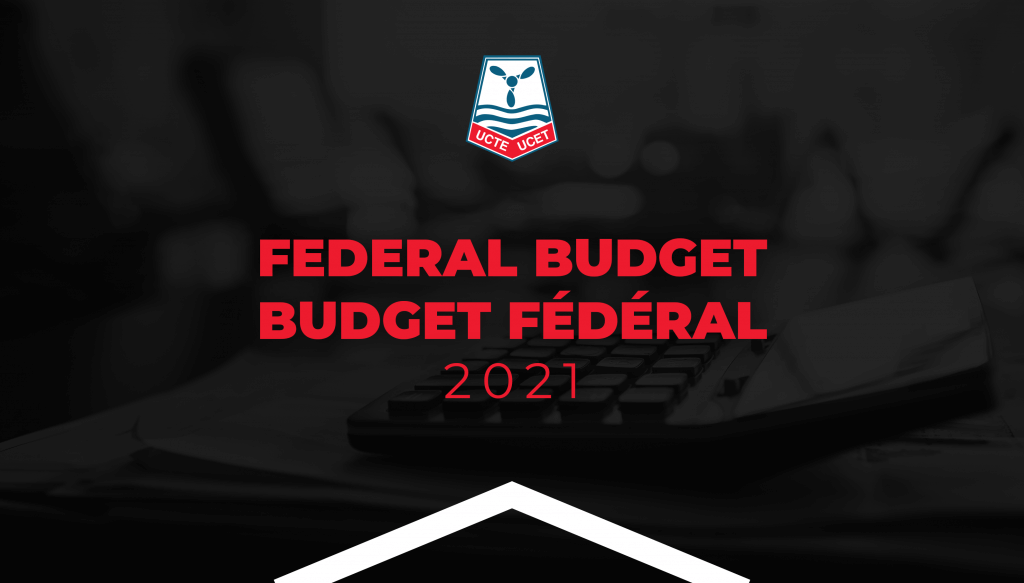Federal Budget 2021: What’s important for UCTE members
On April 19th, Chrystia Freeland, Deputy Prime Minister and Minister of Finance presented the Liberal Government’s budget. Touted as a plan to “finish the fight against COVID-19 and ensure a robust economic recovery”, the budget has both highlights and low lights that impact UCTE members directly:
Universal Child Care
The government has committed spending a maximum of $30 billion spread over 5 years to an affordable national early learning and childcare system. UCTE holds that this will provide working parents the peace of mind needed when it comes to taking care of their families and allow women, who are disproportionately affected, the ability to be an economic driver for our recovery.
Federal minimum wage
For all federally regulated workplaces, this budget proposes to increase the minimum wage to $15 per hour rising with inflation and with provisions to ensure that where provincial or territorial wages are higher, this will prevail.
Canadian Coast Guard
The federal government is proposing funding to extend the emergency towing lease agreements for the West Coast and while a National Emergency Towing Strategy is developed.
It is also planning to spend approximately $71 million over 10 years to ensure the timely delivery of defence and marine procurement projects.
Natural Resources Canada
Government is proposing to spend almost $500 million on various projects including increased mapping of Northern Canada at risk of wildfires, the creation of a Critical Battery Minerals Centre, the establishment of an Atomic Workers Recognition Program and various other research and development projects.
Transport Canada
$9.1 million was committed to the continued development and implementation of the Safer Skies Initiative – a program that was created after Ukraine International Airlines Flight 752 was shot down by Iran on January 8, 2020. Working with other countries and ICAO, the goal of the program is to prevent civil aviation tragedies like this one from ever happening again.
Government also proposes $5.6 million over five years for commemoration initiatives such as scholarships.
To commemorate all victims of air tragedies, the government has also designated January 8th as a National Day of Remembrance for Victims of Air Disasters.
Also to note, under the heading of Supporting Safe Air Travel, Transport Canada is being mandated to ensure that advanced technologies used for identity verification, such as facial recognition, do not introduce negative impacts based on disability, ethnicity, age or gender. It will be given $105.3 million to collaborate with international partners to further advance the Known Traveller Digital Identity Pilot project which will facilitate the advancement and testing of technologies for touchless and secure air travel.
Furthermore, Transport Canada is being given $82. 5 million in 2021-2022 to support major Canadian Airports in making investments in COVID-19 infrastructure.
Funding was also proposed to continue the Canadian Ballast Water Program and the Tanker Safety Inspection Program.
With regards to rail, funding is being provided to Transport Canada and VIA Rail for a program designed to review the potential for a high frequency passenger rail service in the Toronto-Quebec City corridor.
Funding is also proposed for the continuation of the Remote Passenger Rail Program which supports the provision of passenger rail service to certain remote communities with no alternative means of surface transportation.
Canadian Space Agency
The Canadian Space Agency is set to receive over $9.9 million over two years to plan for the next generation of Earth Observation Satellites.
Protections for precarious workers in the Air Industry
The government plans to introduce legislation that would protect precarious workers in the air industry. Its intention is that, when a contract changes hands, affected employees would not be paid less if they are laid off and rehired to do the same work they were doing before
Parks Canada Agency
Funding is proposed to continue to replace future lost visitor revenue due to closures at national parks, conservation areas and national historic sites as a result of COVID-19 restrictions. The agency will also receive funding to maintain its internal capacity to manage its capital assets.
Of interest to note is that there currently is no legal obligation of government to protect the heritage value of many of the federally-owned historic places in Canada. Government is proposing that, should legislation be enacted, Parks Canada receive approximately $28 million over five year to implement a designation framework as well as the sustainable protection of the existing historic sites.
While this budget holds out many promises for many of our members, UCTE is disappointed with the lack of support for Canada’s airports and Nav Canada – organizations that have been gutted by the COVID-19 pandemic.
UCTE remains concerned about the implementation of these programs and/or new legislation. As we all know the devil is in the details.
